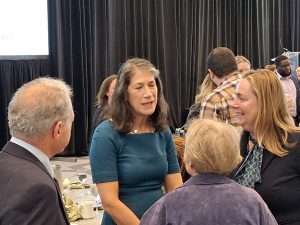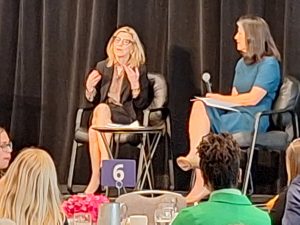Chicago nonprofit fights to keep Head Start funded
By Kevin Beese Staff Writer — July 10, 2025
Diana Rauner (center), president of the Chicago-based nonprofit Start Early, which advocates for early childhood funding and policies at the local, state and federal levels, talks with participants at the Start Early annual lunch in May. Rauner and other Start Early leaders are working to protect federal funding for Head Start early childhood programs. (Photos by Kevin Beese/Chronicle Media)
When individuals who take care of pets bring home more money than individuals taking care of kids, something is wrong, according to a former first lady of Illinois.
“In some states, childcare workers earn less than dog walkers,” said Diana Rauner, president of the Chicago-based nonprofit Start Early, which advocates for early childhood funding and policies at the local, state and federal levels.
Rauner, the wife of former Illinois Republican Gov. Bruce Rauner, said that the administration of President Donald Trump has “put core federal funding for early learning and care in jeopardy.”
“Like so many (nonprofits), we at Start Early have found our days consumed with understanding executive orders, following obtuse agency directives and scenario-planning as we wait for reimbursements that are inexplicably delayed, but unlike many, Start Early has the means and ability to fight back.”
Rauner said the federal Office of Management and Budget’s first budget draft proposed a complete elimination of Head Start, a federally funded program designed to foster the development of young children from low-income families.
“Our federal-facing team, the First Five Years Fund, led a coalition to show support for this program across moderate and vulnerable Republican congressmen,” she said.
Rauner said through much mobilization and action over several weeks, the president’s budget did not follow through on the proposed elimination of Head Start.
She said Start Early leaders do not believe that Head Start is safe, just that the administration chose not to eliminate it in this federal budget.
“We continue to hear of delays in payments and grant renewals and chilling indications that the administration will try to pick off programs and find other ways to weaken or destroy Head Start on the ground,” Rauner added.
Advocacy group

Dr. Catherine Monk, a psychologist and researcher, and Rauner discuss at the Start Early luncheon the impact of prenatal stress and maternal mental health on lifelong outcomes.
With Head Start funding still under the Trump administration’s microscope, Rauner said, her Chicago-based advocacy group has launched Stand for Head Start, a coalition to support regional and state Head Start associations across the country.
She said Stand for Head Start is designed to serve as a bridge between programs in the field and federal agencies.
“We’re doing this work in partnership with other national experts and organizations,” Rauner said.
Yvette Sanchez Fuentes senior vice president of national policy at Start Early, said there has been a lot of stress on local program grantees since the start of Trump’s second administration.
“There have been layoffs of hundreds of (federal) employees and there is uncertainty about funds,”
Fuentes said.
“We are trying to understand the impact of the moves. We are trying to understand the trends,” Fuentes said. “We are checking on how the grantees are doing. If they are not getting their funds, some may have to close.
“I know the stress that this puts on the local level. I worry that this could lead (early childhood) teachers to leave the field.”
The Start Early national policy expert said agencies servicing youth have continuing uncertainty about when funds are going to be released.
“So many grantees wake up on Monday morning and wonder if they have funding. They are going week by week to see if they have the money to keep programs open,” Fuentes said. “Years ago, nonprofits set up lines of credit because of the certainty that they were going to get grants.
“Now, even the banks are weary that agencies are not getting their funds on time.”
Providing support
Fuentes noted that Illinois Head Start programs are working together to support grantees.
“Grantees are doing OK in Illinois. They have congressional support,” Fuentes said. “That is not the case around the country.”
She said Illinois’ early childhood professionals are sharing their tools and knowledge with other in the industry.
“It is not just about us,” Fuentes said of Illinois early childhood advocates. “It is about all of us. We need to be able to support each other. We can’t do it alone.”
She said that Head Start programs are not simply child care.
“Head Start provides services,” Fuentes said. “Families meet goals and Head Start helps them with other issues that come up. They make sure families stay healthy and economically stable.
“We are trying to stay focused on local programs. Head Start helps so many families feel stable.”
Fuentes said Start Early leaders are not just helping groups around the county address challenges with the Trump administration’s policies, they are also looking at expanding their assistance.
“How do we get more engaged? How do we help with home visits, with services for children with disabilities?” Fuentes asked rhetorically.
She said both Illinois government representatives and early childhood advocates are at the forefront of providing assistance to young children and their families.
“Illinois is a leader, with a lot to teach others about providing support,” Fuentes noted. “Illinois is pretty amazing for what it does at the state level and what it does in communities.”
The Start Early senior vice president said any cuts to Head Start programs will prove more costly down the road.
“Head Start is income- and age-based. Most of the kids and families are lower-income families,” Fuentes said. “I think the continued attacks on Head Start means kids are not going to get what they need. They are going to enter school and not be ready.
“Kids who go to Head Start get to school and things for them are so much better. They sit still. They learn. Kids who don’t go to Head Start don’t know about sitting still and getting in lines.”
She added that a lot of Head Start programs also serve pregnant women and families who struggle to get prenatal care.
Fuentes invited residents to visit a Head Start program, “hear about what Head Start teachers are doing.”
She said people can also help support Head Start by calling their congressional representatives and telling them how important the program is and why it needs continued funding.
“Ask businesses to check out local Head Start programs to learn what they are doing. Folks who came out of Head Start programs need to tell their story,” Fuentes said. “People can write an op-ed piece telling their story and how they support kids and their community.”
kbeese@chronicleillinois.com







